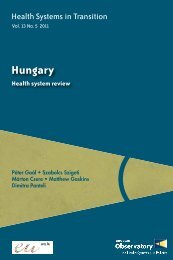Canada - World Health Organization Regional Office for Europe
Canada - World Health Organization Regional Office for Europe
Canada - World Health Organization Regional Office for Europe
You also want an ePaper? Increase the reach of your titles
YUMPU automatically turns print PDFs into web optimized ePapers that Google loves.
<strong>Health</strong> systems in transition <strong>Canada</strong> 29<br />
<strong>Health</strong> Care in <strong>Canada</strong> concluded that the five principles had “stood the test<br />
of time” and continued “to reflect the values of Canadians” (Romanow, 2002,<br />
p.60). At the same time, the Romanow Commission recommended increasing<br />
the modest conditionality of the <strong>Canada</strong> <strong>Health</strong> Act and adding a sixth<br />
principle of accountability. However, most provincial governments oppose<br />
additional conditionality of federal transfers, if only because it would reduce<br />
their own fiscal flexibility and control over budgetary priority setting, and the<br />
federal government has made no changes to the <strong>Canada</strong> <strong>Health</strong> Act since its<br />
introduction.<br />
In addition to providing financial security, universal medicare appears<br />
to have had positive outcomes in reducing health disparities since it was<br />
first introduced. In a study covering 25 years following the introduction of<br />
universal medical care insurance in <strong>Canada</strong>, James et al. (2007) demonstrated<br />
a major reduction in disparity as measured by the rates of death amenable to<br />
medical care.<br />
2.3 <strong>Organization</strong><br />
2.3.1 The provincial and territorial level<br />
Each province and territory has legislation governing the administration of<br />
a single-payer system <strong>for</strong> universal hospital and physician services that has<br />
come to be known as medicare (Marchildon, 2009). In addition to paying <strong>for</strong><br />
hospital care, either directly or through funding <strong>for</strong> RHAs, provinces also set<br />
rates of remuneration <strong>for</strong> physicians that are negotiated with provincial medical<br />
associations (RHAs’ budgets do not include physician services). Provincial<br />
governments also administer a variety of long-term care subsidies and services<br />
as well as prescription drug plans that provide varying degrees of coverage<br />
to residents. These non-medicare services have grown over time relative to<br />
hospital and physician services and constituted roughly 40% of total provincial<br />
and territorial health expenditures in 2011, compared with 23% in 1975 (CIHI,<br />
2011e).<br />
Provincial and territorial ministers of health are responsible <strong>for</strong> the laws and<br />
regulations <strong>for</strong> the administration of universal coverage <strong>for</strong> medically necessary<br />
hospital and physician services. In some jurisdictions, there are two separate<br />
laws, one pertaining to inpatient services and the other to medical services,<br />
while in other jurisdictions, both have been combined in a single law (see<br />
section 9.3). In provinces and territories with RHAs, some of the minister of
















